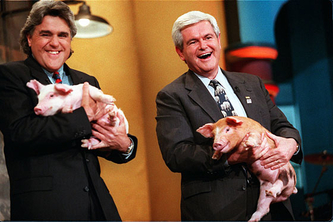IN 1990, George Bush broke his no-new-taxes vow, and conservatives, led by House minority whip Newt Gingrich, despised him for it. In 1994, the Contract with America that Gingrich engineered promised long-overdue tax relief, commencing with a $500-per-child credit and a lower capital-gains tax. In 1995, as speaker of the House, Gingrich pronounced tax cuts "the crown jewel" of the GOP revolution. "Every person in the US is overtaxed," he proclaimed. "So is every business in the US."
Last week, Gingrich suddenly declared that cutting taxes isn't such a priority. "Let's take tax cuts away for a moment," he urged. Rather than "get into a trap" of demanding lower taxes, the speaker said, Republicans ought to cut a deal on President Clinton's proposed $1.7 trillion federal budget, the most bloated in US history.
Looks like Gingrich has — as the liberals say — "grown" in office.
Well, what else is new? If you were holding your breath waiting for congressional Republicans to actually change something, you'd be dead of asphyxiation by now. Twenty-six months have elapsed since the GOP took over, and the scope, power, appetite, intrusiveness, and — above all — cost of the federal government remain undiminished. The Clinton tax hikes that House and Senate Republicans opposed unanimously in 1993 are still on the books in 1997. The Tax Foundation recently reported that, in real dollars, the "total tax burden that a median-income dual-earner family will bear this year will be the highest ever." And the only major piece of legislation passed so far by the 105th Congress is a $2.7 billion increase — repeat, increase — in airline taxes.
And yet, and yet. At least on the need for tax relief, Republicans had seemed steadfast. They had agreed that tax cuts made sense economically (because tax rates are too high), socially (because the tax burden falls most heavily on families with children), and politically (because the issue cuts deeply with grass-roots conservatives). Clinton might demagogue the issue, Democrats might don class-warpaint, but on this, if on nothing else, Republicans were solid: Taxes had to come down.
Indeed, tax cuts were regarded as so critical to GOP fortunes that Bob Dole made them part of his presidential race. Nothing could have rescued Dole's doomed campaign, but this was quite a change for a man who had spent most of his career raising, not lowering, taxes. In the Reagan years, Gingrich used to attacked Dole for obstructing tax cuts. Now he has become Dole.
Liberal editorial writers, always glad to pat a retreating conservative on the head, cheered Gingrich's apostasy. "Newt Gingrich is right," said The Washington Post. "Gingrich is right," said USA Today. "He's exactly right," said the Philadelphia Inquirer. "Gingrich has it right," said The Boston Globe.
No, Gingrich has it wrong, which is why his party erupted at his remarks. The chairman of both the House and Senate tax-writing committees immediately dissociated themselves from Gingrich's capitulation. Two dozen House members signed a letter pledging to vote against any budget bill that "turns its back on our promises to cut taxes"; 17 senators issued a similar threat. Majority leader Dick Armey of Texas, the No. 2 House Republican, made no attempt to hide his displeasure.
The speaker and his advisers clumsily tried to backtrack. "Newt's not de-emphasizing taxes," said Gingrich's astute friend and former spokesman, Tony Blankley, two days after Newt had de-emphasized taxes. Gingrich himself took to the House floor on Friday to insist, "I am deeply committed to lowering taxes."
But it is no longer evident that Gingrich is deeply committed to anything except holding on as speaker. The superb tactician who took power in 1995 quoting "The Federalist" and discoursing on the principles of American civilization is gone. In his place is a sweaty politician of shaky judgment, wounded by the bad press he has gotten and desperate to avoid getting any more.

So now Gingrich plays it safe. He no longer speaks about wiping out the Great Society and the "counterculture value system." He no longer asserts that "the long experiment in professional government has failed." He no longer rallies his party to the task of revolutionizing the federal government and revivifying American liberty. He no longer leads.
Instead, he introduces volleyball pretty boys to the Republican National Convention. He invites Jesse Jackson, who likens conservatives to Nazis, to be his guest during the State of the Union address. He takes pet pigs on Jay Leno's show. And he describes the fight for tax relief as "a trap" that Republicans should avoid.
Two things are clear.
One is that tax cuts later mean tax cuts never. If Republicans give up on reducing taxes now, they will be giving up — period.
The other is that Gingrich has entered twilight time. As the GOP Moses, he led his followers out of the Democrats' House of bondage and brought them safely through the electoral Red Sea of 1996. But today they wander aimlessly in a wilderness of irresolution and self-doubt. It will take someone else to lead them into the Promised Land of smaller government, greater freedom, and civic renewal. It is time for Republicans to start seeking their Joshua.
(Jeff Jacoby is a columnist for The Boston Globe).
-- ## --

